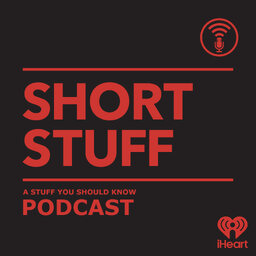The Trivial Pursuit Trivia Edition
For our annual pre-Holiday-Special-holiday-episode-about-a-holiday-toy we are jumping into one of the greatest games of all time, Trivial Pursuit (and we’re not just saying that because there’s an SYSK edition).
In 1 playlist(s)
Stuff You Should Know
If you've ever wanted to know about champagne, satanism, the Stonewall Uprising, chaos theory, LSD, …Social links
Follow podcast
Recent clips

Selects: Why Do Great Flood Myths Seem To Be Universal?
44:03

The Cajun Navy: Heroes or Liability?
38:37

Short Stuff: Color Psychology
12:06
 Stuff You Should Know
Stuff You Should Know